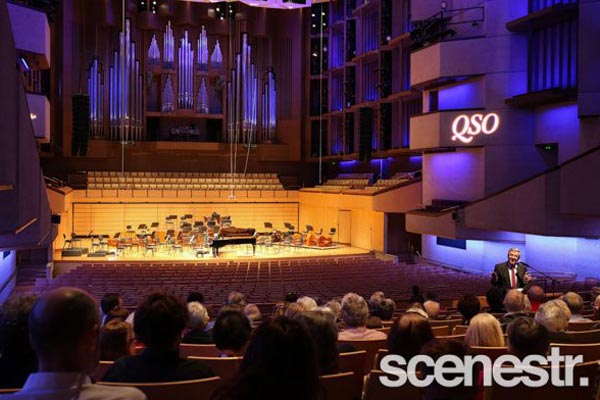QSO soloist-in-residence Nikolai Demidenko is this year looking to consolidate his reputation as a Beethoven authority with the performance of all five piano concerti over the course of two evenings.
With Vassilis Christopoulos conducting the orchestra, he presented the first part of this project on Saturday (21 May).The same pairing of soloist and conductor will complete the cycle in October. A surprisingly balmy May evening drew a large and enthusiastic crowd (cue clapping between movements and enter that debate if you dare!) and the concert was recorded for later broadcast on Foxtel Arts.
Demidenko is a tall man, with a somewhat stooped appearance, and a serious, albeit avuncular demeanour. Although he seemed diffident when facing the audience, it is his approach to the keyboard that counts and he was not found wanting in this department — his passion for the music was manifest in his delivery.
Closer to Mozart perhaps than the other works here presented, piano concerto No. 1 begins with a beautifully melodic orchestral section, before the piano joins in midway through the first movement. Demidenko’s virtuosity was immediately apparent as he demonstrated both a delicacy of touch and a management of tempo that took control of proceedings, governing the alternating dialogue between piano and orchestra. This was particularly evident in the second movement where the silky sound of the clarinets entwined around the piano’s notes, and in the third movement where a light-hearted flirtatious conversation dances its way through the piece.
Photos from QSO's Beethoven Cycle #1
Piano concerto No. 3 was possibly written with showier intent and certainly the piano part requires a step up in gear. This was achieved in fine style, with Demidenko’s fingers rippling effortlessly up and down the keyboard, his face seemingly in rapturous enjoyment of the music. Overall, this may be a less successful concerto than those presented before and after it, and as such there may be less pressure associated with its performance. Perhaps what we witnessed here was Demidenko relaxing and surrendering into the music, and of all the pieces, the soloist appeared to enjoy playing this the most.
The Coriolan Overture was an opportunity for Vassilis Christopoulos to put the orchestra through its paces, and show what he could do without the distraction of the piano in their midst. It was well done, and much appreciated, but overshadowed somewhat by a sense of anticipation for the final piece of the programme.
Piano concerto No. 4 is arguably the best loved of Beethoven’s piano concerti, and introduces some innovations that see the form move much more determinedly towards romanticism. Nowhere is this truer than in the second movement where the imagery of Orpheus taming the Furies at the gates of Hades (first suggested by Beethoven’s 1859 biographer and much expanded upon since) is conjured from the score with the gently sad supplication of the piano interrupted by the stern rebuttal of the orchestra, in a wordless but nonetheless vivid dialogue. Both Demidenko and Christopoulos earned their plaudits for their roles in bringing this drama to life.
Finishing on this pinnacle resulted in a well-deserved standing ovation, and we were rewarded with two piano solo encores, before emerging from the evening feeling rejuvenated and restored. Look forward to October!
Ludwig van Beethoven — Piano Concerto No.1 in C, Op.15
Ludwig van Beethoven — Piano Concerto No.3 in C minor, Op.37
Ludwig van Beethoven — Overture to Coriolan, Op.62
Ludwig van Beethoven — Piano Concerto No.4 in G, Op.58

